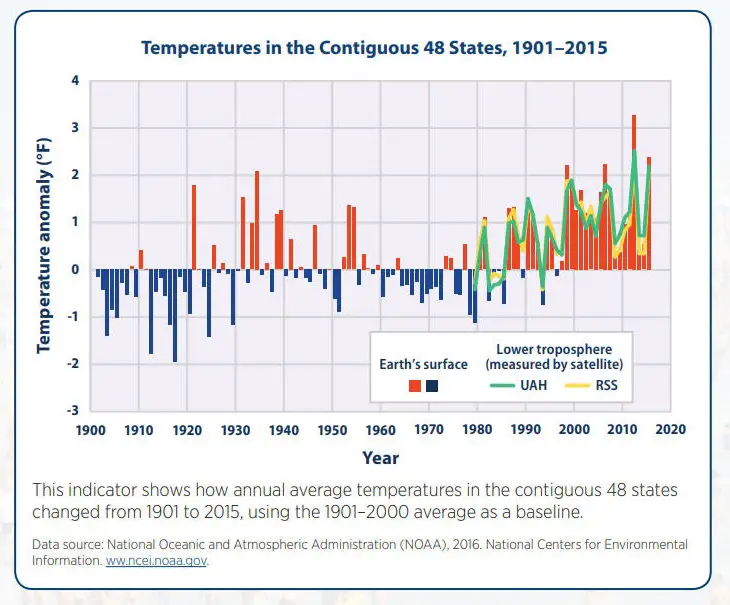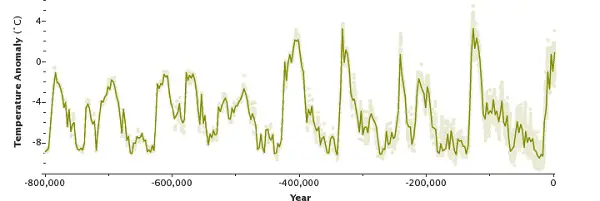
Over the past several decades, individuals have become increasingly aware of the connection between the actions they take on a day-to-day basis and overall environmental quality. Many common actions add greenhouse gases to the atmosphere - starting a car, turning on a light, heating and cooling our homes, taking out the trash. In the United States, 6.6 metric tons of greenhouse gases are emitted per person every year. Emissions per person have increased by 3.5% between 1990 to 1997.
But you really need to look at a longer period of time, than just the past 120 years. It turns out, an ice age is overdue, if you look at a longer period. See the second temperature chart at right below, showing the cycling nature of climate change which has been going on for millions of years before mankind even existed.
See this statement: from Science.org.au:
According to most estimates, the rate of average surface warming has slowed since 2001, despite ongoing rises in greenhouse gases. This slowdown is consistent with known climate variability. Indeed, decades of little or no temperature trend can be seen throughout the last century, superimposed on the long-term warming trend.
Once, all climate changes occurred naturally. However, during the Industrial Revolution, we began altering our climate and environment through changing agricultural and industrial practices. Before the Industrial Revolution, human activity released very few gases into the atmosphere, but now through population growth, fossil fuel burning, and deforestation, we are affecting the mixture of gases in the atmosphere.
The debate is about HOW MUCH DO MANKIND'S ACTIVITIES CONTRIBUTE TO CLIMATE CHANGE? Lately, any scientist who suggests that mankind's activities are not the primary cause of climate change becomes censored and ridiculed and called a "climate change denier" by the mass media, social media giants and search engines. This is exactly how the mainstream organizations treated Copernicus and Galileo in the 1600's when they suggested the earth orbited the sun! This is the opposite of what a scientific and objective debate should be.
However, many actions can lower emissions as well - the opportunity exists for each of us to reduce our contribution to the atmospheric concentration of greenhouse gases. "Individuals Can Make A Difference" identifies actions that many households can take that reduce greenhouse gas emissions in addition to other benefits, including saving you money! "Smart Savings: Climate Solutions for Cities" identifies areas where we can work together within our communities and with our local officials to save money, save energy, clean the air, reduce congestion, curb sprawl, and reduce greenhouse gas emissions.
There is information throughout EHSO's site of potential interest to the concerned citizen. Below, you will find brief descriptions of the site's major sections which address climate science, greenhouse gas emissions, potential global warming impacts, and the actions conducted or supported by governments, corporations, small businesses, and individuals that help address global warming issues.
For more recent data and a discussion of climate change, see this page .

 Rising global temperatures are expected to raise sea level, and change precipitation and other local climate conditions. Changing regional climate could alter forests, crop yields, and water supplies. It could also threaten human health, and harm birds, fish, and many types of ecosystems. Deserts may expand into existing rangelands, and the character of some of our National Parks may be permanently altered. Unfortunately, many of the potentially most important impacts depend upon whether rainfall increases or decreases, which can not be reliably projected for specific areas.
Rising global temperatures are expected to raise sea level, and change precipitation and other local climate conditions. Changing regional climate could alter forests, crop yields, and water supplies. It could also threaten human health, and harm birds, fish, and many types of ecosystems. Deserts may expand into existing rangelands, and the character of some of our National Parks may be permanently altered. Unfortunately, many of the potentially most important impacts depend upon whether rainfall increases or decreases, which can not be reliably projected for specific areas.
![]()
For detailed information, on impacts on Forests and Water Resources or on Human Health
| Selected chapters from the IPCC publication, The Regional Impacts of Climate Change - An Assessment of Vulnerability (1998), are available on the EPA Global Warming Site. |
Today, action is occurring at every level to reduce, to avoid, and to better understand the risks associated with climate change. Many cities and states across the country have prepared greenhouse gas inventories; and many are actively pursuing programs and policies that will result in greenhouse gas emission reductions.
At the national level, the U.S. Global Change Research Program (USGCRP) coordinates the world's most extensive research effort on climate change. In addition, the Clinton Administration is actively engaging the private sector, states, and localities in partnerships based on a win-win philosophy and aimed at addressing the challenge of global warming while, at the same time, strengthening the economy.
At the global level, countries around the world have expressed a firm commitment to strengthening international responses to the risks of climate change. The U.S. is working to strengthen international action and broaden participation under the auspices of the Framework Convention on Climate Change.
In addition, you can access the latest climate related news, articles, speeches, and information about upcoming events. And, before you leave EHSO, visit the Global Warming
Links area to find some of the best climate related sites on the World Wide Web.
Ways to save money AND help the environment:
Eat healthier AND save money: Instant Pot Duo Crisp 11-in-1 Air Fryer and Electric Pressure Cooker Combo with Multicooker Lids that Fries, Steams, Slow Cooks, Sautés, Dehydrates
Save water AND money with this showerhead adapter, it lets the water flow until the water is hot, then shuts off water flow until you restart it, ShowerStart TSV Hot Water Standby Adapter
Protect your health with these:
Mattress Dust mite-Bedbug protector, 100% Waterproof, Hypoallergenic, Zippered
Handheld Allergen Vacuum Cleaner with UV Sanitizing and Heating for Allergies and Pet, Kills Mite, Virus, Molds, True HEPA with Powerful Suction removes Hair, Dander, Pollen, Dust,
Immune Support Supplement with Quercetin, Vitamin C, Zinc, Vitamin D3
GermGuardian Air Purifier with UV-C Light and HEPA 13 Filter, Removes 99.97% of Pollutants
5 Stage Air Purifier, Features Ultraviolet Light (UVC), H13 True Hepa, Carbon, PCO, Smart Wifi, Auto Mode, Quiet, Removes 99.97% of Particles, Smoke, Mold, Pet Dander, Dust, Odors
Interesting Reads:
THE PREPPER'S CANNING & PRESERVING BIBLE: [13 in 1] Your Path to Food Self-Sufficiency. Canning, Dehydrating, Fermenting, Pickling & More, Plus The Food Preservation Calendar for a Sustainable Pantry
The Backyard Homestead: Produce all the food you need on just a quarter acre! Paperback
The Citizens' Guide to Geologic Hazards: A Guide to Understanding Geologic Hazards Including Asbestos, Radon, Swelling Soils, Earthquakes, Volcanoes
The Uninhabitable Earth: Life After Warming
Book: The Sixth Extinction:
An Unnatural History Paperback